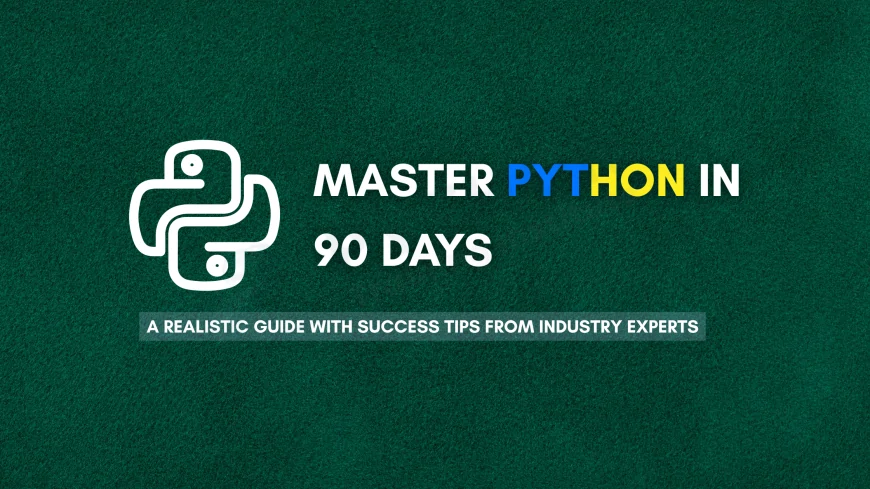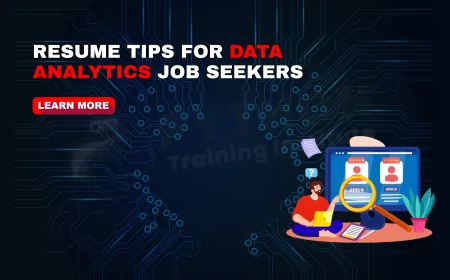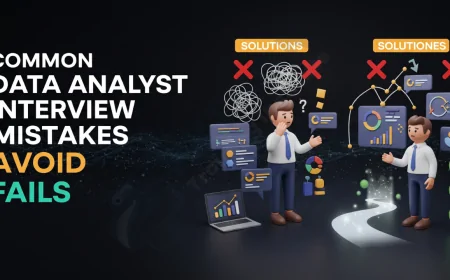Can I Learn Python in 3 Months? Expert Tips | Strategies for Success
Wondering if you can learn Python in just 3 months? Discover practical tips, effective study plans, and the best training courses, including Python Institutes in Pune, to help you achieve your Python goals in record time.

Learning a programming language in a short amount of time might seem intimidating, but with the right approach and mindset, it’s completely possible. Many aspiring developers wonder, “Can I really learn Python in 3 months?” The short answer is, yes, you can. However, it depends on a variety of factors, including your background, commitment level, and learning resources.
In this blog post, we’ll explore whether learning Python in 3 months is feasible, outline a comprehensive roadmap to guide you, and offer tips to help you make the most of your learning journey. Whether you’re starting from scratch or have some experience in programming, Python is an excellent language to master. So, let’s dive into how you can achieve this goal in just three months.
Why Python is Ideal for Beginners
Before we delve into the 3-month roadmap, it’s important to understand why Python is often recommended as the perfect programming language for beginners. Here are a few reasons why Python stands out:
-
Simple and Readable Syntax: Python’s syntax is clean, concise, and easy to understand. This makes it ideal for people who are new to programming.
-
Versatility: Python can be used for a wide range of applications, from web development to data analysis, machine learning, automation, and much more.
-
Large Community and Support: Python has a vast and active community. Whether you encounter a problem or need learning resources, there’s an abundance of tutorials, forums, and documentation available.
-
Rich Libraries and Frameworks: Python comes with a variety of powerful libraries and frameworks that make it easier to build projects quickly.
Given these advantages, it’s easy to see why learning Python is a smart choice. Now, let’s explore how you can make the most of the next three months.
Month 1: Building the Foundations
The first month should be dedicated to getting comfortable with Python’s syntax, basic concepts, and key data structures. At this point, you’re laying the foundation that will support more advanced topics later on.
Week 1: Introduction to Python
-
Set Up Your Development Environment: Start by installing Python on your system and setting up an Integrated Development Environment (IDE) like PyCharm, VS Code, or even a simple text editor like Sublime Text.
-
Basic Syntax and Variables: Learn about Python’s syntax, including how to write simple programs, work with variables, and use different data types such as integers, floats, and strings.
-
Control Structures: Get comfortable with if-else statements, loops (for, while), and basic logical operators (and, or, not).
Learning Resources:
-
Python documentation:
-
Interactive Python exercises:
Week 2: Working with Functions
Functions are a fundamental concept in Python, and understanding how to define and use them is crucial.
-
Defining Functions: Learn how to create functions, pass arguments, and return values.
-
Function Scope: Understand the concept of local and global variables, and how they affect your functions.
-
Recursion: Explore basic recursion to get an idea of how functions can call themselves.
Week 3: Data Structures and Collections
Python offers a variety of built-in data structures that you’ll need to master in order to build efficient programs.
-
Lists, Tuples, and Sets: Learn how to use these collection types to store and manipulate data.
-
Dictionaries: Understand how to store key-value pairs and work with them efficiently.
-
List Comprehensions: This is an important feature in Python that allows you to create new lists from existing ones.
Week 4: Basic File I/O and Error Handling
At this point, you should be comfortable working with data in Python.
-
File Input/Output (I/O): Learn how to read from and write to files using Python.
-
Error Handling: Understand how to handle exceptions with try/except blocks to make your programs more robust.
Practice Project:
At the end of Month 1, try building a small project like a calculator or a number guessing game to reinforce your learning.
Month 2: Diving Deeper into Python
The second month is about mastering more advanced concepts and starting to apply your knowledge through projects.
Week 1: Object-Oriented Programming (OOP)
Python is an object-oriented language, and learning OOP is key to building scalable applications.
-
Classes and Objects: Learn how to define classes and create objects in Python.
-
Methods and Attributes: Understand the difference between methods and attributes, and how to define them within a class.
-
Inheritance and Polymorphism: Explore the concepts of inheritance, where one class inherits properties from another, and polymorphism, where the same method can work with different types of objects.
Week 2: Working with Libraries and Modules
At this point, it’s time to explore Python’s powerful libraries and modules.
-
Modules and Packages: Learn how to organize your code into reusable modules and packages.
-
Popular Python Libraries: Get introduced to some commonly used libraries like NumPy (for numerical computing), Pandas (for data manipulation), and Matplotlib (for data visualization).
-
Installing Libraries: Learn how to install and manage third-party libraries using pip.
Week 3: Introduction to Web Development or Data Science
By now, you’ll want to start applying Python to real-world applications. In this week, you can choose between two popular paths: web development or data science.
-
Web Development (using Flask or Django): If you’re interested in web development, try learning the basics of Flask or Django, which are popular web frameworks in Python.
-
Data Science (using Pandas and Matplotlib): If you’re interested in data science, focus on learning how to load, clean, and manipulate data using Pandas, and create basic data visualizations with Matplotlib.
Week 4: Practice Project
The second month should culminate in a more complex project, depending on the path you chose.
-
Web Development Project: Build a simple web application, like a to-do list or a blog using Flask or Django.
-
Data Science Project: Try analyzing a dataset and building basic visualizations, such as a data report or a stock market analysis tool using Python.
Month 3: Mastery and Advanced Topics
By the third month, you should have a solid understanding of Python’s core concepts. Now, it’s time to dive into more advanced topics, explore Python’s ecosystem further, and build a portfolio of projects.
Week 1: Working with APIs
APIs are essential in many applications, and Python makes it easy to work with them.
-
What is an API? Understand how APIs allow different applications to communicate.
-
Making API Requests: Learn how to use Python’s
requestslibrary to interact with APIs. -
JSON: Learn how to handle JSON data, which is commonly used for API responses.
Week 2: Testing and Debugging
Testing and debugging are crucial for creating reliable Python applications.
-
Unit Testing: Learn how to write unit tests in Python using the
unittestmodule. -
Debugging: Get familiar with Python’s built-in debugging tools, such as
pdb, to help troubleshoot issues in your code. -
Best Practices: Explore some best practices in Python development, including code quality tools like
flake8andblack.
Week 3: Advanced Libraries and Frameworks
This week, you can dive deeper into libraries or frameworks that interest you.
-
Machine Learning (with Scikit-Learn): Start learning basic machine learning concepts and use the scikit-learn library to implement simple algorithms like linear regression and classification.
-
Web Scraping (with BeautifulSoup or Scrapy): Learn how to scrape data from websites using Python, which is useful for a variety of applications like data collection and research.
Week 4: Capstone Project
For your final project, try to combine all the skills you’ve learned. This could be:
-
A web application that interacts with a database and has a user interface.
-
A data analysis project where you clean, analyze, and visualize real-world data.
-
A machine learning project where you implement a predictive model.
FAQ's
1. Can I really learn Python in 3 months?
Yes, with consistent effort and the right resources, learning Python in 3 months is achievable. Enrolling in a focused Python training course, such as those offered by a Python Training Institute in Pune, provides structured guidance, hands-on projects, and expert support, helping you master the fundamentals and accelerate your learning.
2. What are the prerequisites to learn Python in 3 months?
There are no strict prerequisites to learn Python, but having a basic understanding of logic and problem-solving skills can help. If you enroll in a Python Training Course in Pune, you’ll start with foundational concepts and gradually advance to complex topics, making it accessible for beginners.
3. What should I learn in the first month of Python?
In the first month, focus on the basics: Python syntax, variables, loops, functions, and control structures. A Python Training Institute in Pune will provide you with a structured curriculum, helping you grasp these essential concepts before moving on to more advanced topics like data structures and object-oriented programming.
4. Is it possible to learn Python without prior programming experience?
Yes, Python is one of the best languages for beginners. With a Python Training Course in Pune, you’ll be introduced to fundamental programming concepts and Python-specific syntax, making it easier to learn even if you don’t have prior programming experience.
5. Can I get a job after learning Python in 3 months?
While mastering Python in 3 months is possible, securing a job requires more than just learning the language. You’ll need to build practical skills through projects, internships, and problem-solving. Enrolling in a Python Training Course in Pune with placement assistance can significantly boost your chances of landing a job.
6. What career paths can I pursue with Python?
Learning Python opens doors to many career paths like web development, data science, machine learning, automation, and software engineering. A Python Training Institute in Pune will equip you with the skills to explore these fields and enhance your job prospects through industry-relevant training.
7. How many hours a day should I study Python to learn it in 3 months?
To learn Python in 3 months, aim for 2-3 hours of focused study daily. If you enroll in a Python Training Course in Pune, the course schedule will ensure you’re covering the key topics systematically, allowing you to learn at an optimal pace without feeling overwhelmed.
8. What are the most important Python concepts to learn in 3 months?
In 3 months, focus on the core concepts: Python syntax, functions, control flow, data structures (lists, tuples, dictionaries), object-oriented programming, and libraries like NumPy and Pandas. A Python Training Institute in Pune will help you prioritize these concepts and build a strong foundation for your coding journey.
9. How can I practice Python effectively in 3 months?
Practice is key to mastering Python. Work on small projects, solve coding challenges on platforms like LeetCode or HackerRank, and participate in coding contests. A Python Training Institute in Pune provides you with assignments and real-world projects that enhance your coding skills and build a strong portfolio.
10. How does a Python Training Institute in Pune help with learning in 3 months?
A Python Training Institute in Pune offers structured courses that provide expert guidance, hands-on practice, and access to real-world projects. They also offer mentorship, which accelerates learning and ensures you’re on track to master Python within 3 months, setting you up for career success.
11. What is the role of projects in learning Python?
Projects play a crucial role in reinforcing your knowledge of Python. They allow you to apply what you've learned to solve real-world problems. A Python Training Course in Pune often includes project work, helping you build a portfolio that demonstrates your skills to potential employers.
12. Can I specialize in data science after learning Python in 3 months?
Yes, learning Python is the first step towards becoming proficient in data science. In a Python Training Institute in Pune, you’ll learn libraries like Pandas and Matplotlib, which are crucial for data analysis. You can then build on this foundation with additional training in data science to specialize further.
13. How can I prepare for Python certification in 3 months?
To prepare for Python certification in 3 months, focus on mastering core Python concepts, complete practice exams, and engage in mock interviews. A Python Training Institute in Pune offers certification courses that are aligned with industry standards, providing a clear path to earning your Python certification.
14. How long does it take to become proficient in Python?
Becoming proficient in Python depends on your commitment and practice. While 3 months will give you a solid foundation, it may take an additional 3-6 months to become truly proficient. Enrolling in a Python Training Course in Pune ensures that you stay on track with regular assessments and practical projects.
15. What tools or software should I use while learning Python?
While learning Python, you can use IDEs like VS Code, PyCharm, or Jupyter Notebook for interactive coding. A Python Training Institute in Pune will recommend the best tools to help you optimize your learning experience and increase productivity, making it easier to write, test, and debug your code.
16. Can I learn Python at my own pace?
Yes, Python can be learned at your own pace through online courses, books, or tutorials. However, enrolling in a structured Python Training Course in Pune provides a roadmap and ensures you stay focused and accountable, which is especially helpful when aiming to learn Python in a short period like 3 months.
17. How do I stay motivated while learning Python?
Staying motivated while learning Python can be challenging, but setting clear goals, taking regular breaks, and celebrating small milestones helps. A Python Training Institute in Pune often provides peer support and a learning community that keeps you motivated and engaged throughout the process.
18. What is the best way to learn Python for web development?
For web development, you should focus on learning Python frameworks like Flask or Django. A Python Training Course in Pune often includes web development modules that teach you how to create dynamic web applications, offering practical knowledge and hands-on experience that is highly valued by employers.
19. How can I improve my problem-solving skills in Python?
Improving problem-solving skills requires practice and exposure to various coding challenges. Regularly solve problems on coding platforms like Codewars or HackerRank. A Python Training Institute in Pune provides problem-solving exercises that will help you strengthen your logical thinking and coding skills, making you a proficient programmer.
20. What are the benefits of learning Python in Pune?
Pune is a hub for IT and tech education, making it an ideal place to learn Python. By enrolling in a Python Training Course in Pune, you’ll have access to high-quality education, industry-relevant training, networking opportunities, and placement support, giving you a competitive edge in the job market.
Can You Learn Python in 3 Months?
In conclusion, yes, it is absolutely possible to learn Python in 3 months, but the key is consistency and smart learning. By following a structured roadmap, practicing regularly, and challenging yourself with projects, you can go from a complete beginner to a competent Python developer in three months.
However, learning doesn’t stop after 3 months. To truly master Python, you must continue learning and building on your knowledge. Don’t expect to know everything in three months, but with dedication, you can build a solid foundation that will serve you well in your programming journey.
What's Your Reaction?
 Like
0
Like
0
 Dislike
0
Dislike
0
 Love
0
Love
0
 Funny
0
Funny
0
 Angry
0
Angry
0
 Sad
0
Sad
0
 Wow
0
Wow
0
















